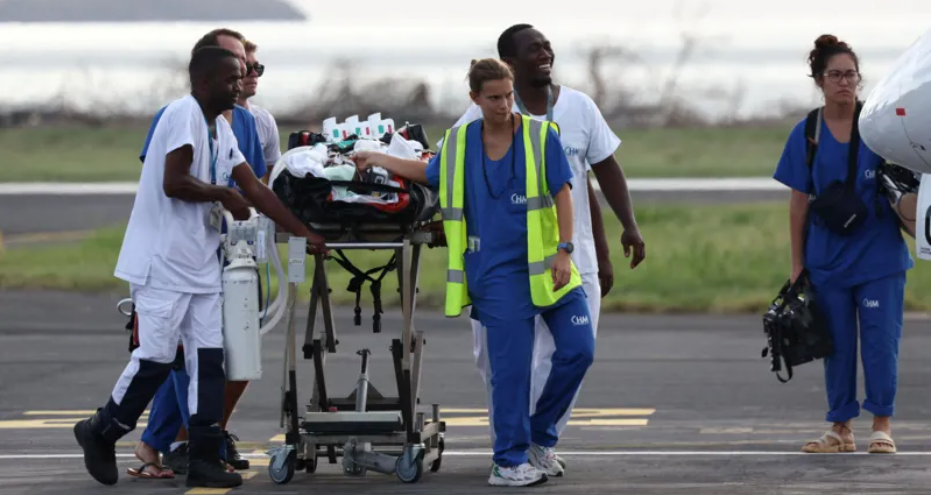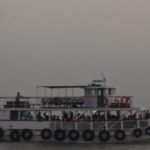Tens of thousands without water in Mayotte as curfew brought in
Tens of thousands of people in Mayotte remain without access to water after Cyclone Chido struck the French Indian Ocean territory, as rescuers work tirelessly to locate missing individuals.
According to preliminary reports from France’s interior ministry, 22 people have been confirmed dead, but Mayotte’s prefect has warned that the death toll could reach into the thousands.
Health officials are worried about the potential spread of infectious diseases, as residents face shortages of clean drinking water, and stores are rationing supplies. Additional aid is expected to arrive on Wednesday.
The islanders spent their first night under a curfew from 22:00 local time on Tuesday to 04:00 on Wednesday (19:00 to 01:00 GMT) as a measure to prevent looting.
“Everyone is rushing to the stores for water. There is a general shortage,” Ali Ahmidi Youssouf, 39, told AFP on Wednesday as he carried a few bottles in the community of Pamandzi, located on the main island of the archipelago.
Authorities have prioritized restoring damaged water plants. On Wednesday, they reported that the water system had been partially restored, and they hope that by evening, 50% of the population will have access to water.
The French government announced that 120 tonnes of food will be distributed on Wednesday, while President Emmanuel Macron is expected to visit Mayotte on Thursday.
Half of the territory remains without power, and a newly implemented curfew mandates that people stay indoors for six hours overnight to prevent looting.
“We don’t have electricity,” Ambdilwahedou Soumaila, the mayor of the capital, Mamoudzou, told Radio France Internationale. “When night falls, there are people who take advantage of that situation.”
Mayotte is one of the poorest parts of France, with many of its residents living in shanty towns.
Chido – the worst storm to hit the archipelago in 90 years – brought wind speeds of more than 225km/h (140mph) on Saturday, flattening areas where people live in shacks with sheet metal roofs and leaving fields of dirt and debris.
“It was like a steamroller that crushed everything,” Nasrine, a teacher who did not give her last name, told AFP in her destroyed neighbourhood in Pamandzi.
Another witness to the storm told Reuters that roofs “flew away as if they were pieces of paper”.
“A gust of wind broke the window and tore a wooden plank. The planks were 2m by 3m (6.5 by 9.8ft),” said Diego Plato, a photographer with the 5th Foreign Regiment of the French Legion.
He added that many of the legion’s buildings cannot function any more because they no longer have roofs.
Rescuers are now searching for survivors in the ruins, such as in Mamoudzou, while trying to unblock roads and clear rubble and downed trees.
On Wednesday morning, Mamoudzou residents whose houses survived the storm hammered metal sheets over damaged roofs.
Francois-Xavier Bieuville, Mayotte’s prefect, previously told local media the death toll could rise significantly once the damage was fully assessed.
He warned it would “definitely be several hundred” and could reach thousands.
Chido also killed at least 45 people in Mozambique, and at least 13 in Malawi, according to those countries’ disaster management departments.
Officials have said that Mayotte’s relatively low official toll is due to many areas being inaccessible and some victims already being buried.
The difficulty is compounded by uncertainty about Mayotte’s population size.
The territory officially has 320,000 inhabitants, but authorities estimate about 100,000 to 200,000 undocumented migrants may be living there.
Initial figures from the interior ministry show that 1,373 people in Mayotte were injured.
France’s newly instated Prime Minister François Bayrou told parliament on Tuesday that there were “200 badly wounded and 1,500 wounded in a relative state of urgency”.
“I have never seen a disaster of this magnitude on national soil,” Bayrou said later in a post on X.
“I think of the children whose houses have been swept away, whose schools have been almost all destroyed and whose parents are extremely distraught.”
The government said it was sending in supplies via an air bridge from its other Indian Ocean territory, Reunion Island.
On Wednesday, 100 tonnes of food are due to be distributed on the larger island of Grand-Terre in Mayotte, while 20 tonnes are set to be handed out on the smaller island of Petite-Terre.
A French navy support and assistance vessel is also due to arrive in Mayotte on Thursday morning with 180 tonnes of freight on board.
The ferry linking Mayotte’s two main islands resumed services on Wednesday, allowing some people caught out by the storm to return to their families.
“I haven’t heard a word from my employees in five days,” a landowner taking the ferry, who declined to give his name, told Reuters. “It’s back to the Stone Age.”
Meanwhile, in Malawi – where Chido headed after moving through Mayotte – authorities say 13 people were killed.
Up to 20 of the country’s 29 districts have experienced “mild to severe damages” affecting about 35,000 people, a statement from the disaster management department said.
The number of deaths and level of destruction is lower than in neighbouring Mozambique where authorities put the death toll at 45.
Experts say seasonal storms like Chido are intensifying in strength because of warmer ocean waters.
The cyclone poses another challenge for the government following months of political turmoil, with Bayrou appointed last week following the ousting of former Prime Minister Michel Barnier.



